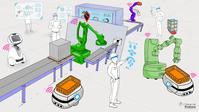Nof, PRISM to be part of ‘factory of the future’ simulations
Purdue University researchers in collaboration with the Massachusetts Institute of Technology and Indiana University will develop new technologies alongside a platform that will allow manufacturers to realistically simulate interactions between workers, robots and machines to prepare for the factories of just five to 10 years from now. The work is supported by a $2.5 million grant by the National Science Foundation's Future of Work at the Human-Technology Frontier program, one of 10 new Big Ideas for Future Investment.
One of the researchers involved is Shimon Nof, Purdue professor of industrial engineering and director of the PRISM Center for Production, Robotics and Integration Software for Manufacturing and Management. He, his team and other Purdue researchers will investigate the various ways that humans could collaborate with robots using this new platform.
Research on the emerging factory of the future has been conducted at the PRISM Center for over a decade, as described in the book Revolutionizing Collaboration Through e-Work, e-Business, and e-Service (Nof, Ceroni, Jeong, and Moghaddam, Springer 2015), and the article "The Collaborative Factory of the Future" (Moghaddam and Nof, International Journal of Computer Integrated Manufacturing Systems, 2017). Purdue IE offers several courses on this topic, including Industrial Robotics and Programmable Assembly (IE574), Design of e-Work and e-Service Systems (IE588), and Cyber Methods for Production Control (IE674).
Summarized from Purdue News (Oct. 10, 2018)
Full article: Tech to prepare manufacturers, workers for the 'factory of the future' (Writer: Kayla Wiles, 765-494-2432, wiles5@purdue.edu)
A YouTube video prepared by Jared Pike, communications specialist for the Purdue University School of Mechanical Engineering, is available at https://youtu.be/RHYQJNf7BEY.

